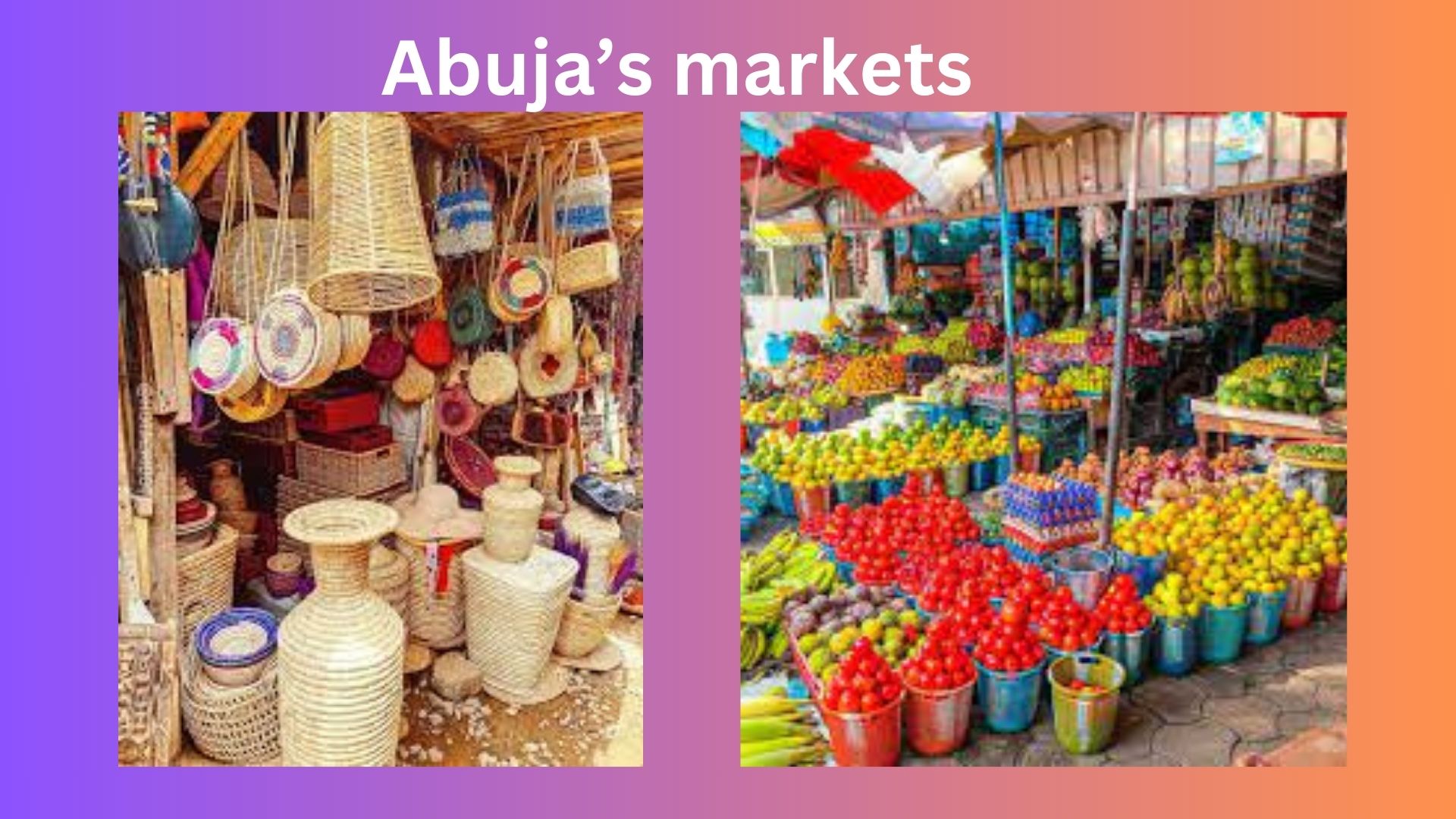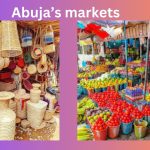Ways Visitors Can Navigate Abuja’s Markets. Tourists can get a sense of the local way of life and commerce by exploring Abuja’s marketplaces.
Navigating busy areas requires skill, whether you’re seeking souvenirs, fresh fruit, or unique crafts.
The text provides five effective strategies to navigate Abuja’s crowded marketplaces efficiently and enjoyable.
1. For convenience, use ride-hailing services.
Uber and Bolt are two ride-hailing apps that make getting around Abuja simple.
GPS-enabled services enable users to book rides to popular marketplaces like Wuse or Garki.
Locally savvy drivers make sure you stay away from traffic jams.
Why Pick a Ride-Hailing Service?
- Cars have air conditioning and are comfy.
- No negotiating on transportation costs.
Advice
- Make sure there are enough funds in your app for smooth transactions.
2. Take Advantage of Okadas’ Local Experience
Motorbike taxis, or okadas, are quick and can easily navigate through traffic.
Okadas offer speedy fixes if you’re going to markets like Nyanya or Utako during busy times.
Always haggle over the price before you set out.
Advice on Safety
- If you want to be safe on busy roads, wear a helmet.
Benefits
- An inexpensive mode of transportation.
- Ideal for short journeys.
3. Use Minibuses to Travel on a Budget
In Abuja, minibuses are the most widely used form of public transportation.
Routes to important marketplaces like Mararaba or Dei-Dei are served by minibuses.
Although they are affordable, they might not be very comfortable, particularly in a hurry.
Important Routes
- Connect from Berger Junction to Wuse Market.
- Take a bus at the Area 1 terminal to get to Garki Market.
Travel Advice
- To pay precise fares, keep small coins on hand.
4. For the Most Flexibility, Rent a Car
Renting a car gives you the freedom and convenience to visit different markets.
Abuja car rental companies offer day or weekly rental choices.
For travelers who value flexibility and personal space, this is perfect.
What Should I Look for Before Renting?
- A current driver’s license.
- Insurance provided by the rental company.
Bonus
- For people who are not familiar with Abuja roads, a car with a driver is offered.
5. Take Part in Market Tours
Numerous tour companies provide guided tours of the markets in Abuja.
Transportation, market navigation, and local knowledge are all included in these visits.
For first-time tourists who want to avoid uncertainty or language barriers, they are excellent.
Well-liked Market Tours
- Tours of Wuse Market’s crafts.
- Utako Market offers tours of fresh food.
Why Take a Tour?
- You save time and gain personal knowledge of Abuja culture.
6. Take a Walk to Get Involved
In marketplaces, walking is the ideal way to explore connected vendors.
The layouts of markets like Wuse and Garki are small.
Walking allows you to pause at visually appealing stalls without feeling hurried.
Advantages
- Improved communication with dealers.
- Chance to have a close look at local life.
Essential Equipment
- Keep a water bottle with you and wear comfortable shoes.
7. Use Guides to Take Advantage of Local Knowledge
To navigate crowded markets more easily, hire native guides.
Guides can assist in negotiating because they are knowledgeable about market layouts.
They enhance your shopping experience by offering cultural information as well.
Where Can I Get Guides?
- Hotels and tour companies frequently have a list of reliable guides.
- The price
Usually reasonably priced, particularly for group excursions.
8. Use Tricycles (Keke Napep) instead
Tricycles, also known as Keke Napep, are a common substitute for taxis.
For short travels within markets and neighborhoods, they are ideal.
Kekes are inexpensive and have access to tight roads that are difficult for automobiles to navigate.
Well-liked Paths
- From Wuse Market to Garki.
- Around Mpape and other local markets.
Expert Advice
- Before the journey starts, haggle about your fare.
9. Make Plans During Busiest Market Hours
You can browse markets more easily if you visit them during off-peak hours.
Abuja’s markets are their busiest between 10 a.m. and 4 p.m.
You may get fresh produce and avoid crowds by getting there early.
Suggested Hours
- Food and groceries: Food and groceries are best purchased in the early morning.
- Late afternoons: Ideal for crafts and mementos.
Extra Advice
- Major markets are often quieter on Sundays.
10. Prepare for the Market Using Online Resources
Products that are available in local markets are displayed on websites like Konga and Jumia.
These platforms provide information on product availability and cost, but they cannot replace in-person visits.
This aids travelers in effectively organizing their shopping list.
How It’s Beneficial
- To prevent overspending, compare costs.
- Before you go, learn about the local market trends.
Additional Convenience
- Certain platforms provide delivery services to your address in Abuja.
Responding to Common Questions
1. How should one navigate the markets of Abuja?
Taking guided trips or using ride-hailing apps is easy and stress-free.
2. Are tourists secure in Abuja’s markets?
They are safe, indeed. Remain vigilant at all times and refrain from carrying valuables.
3. How can I haggle over costs in the markets of Abuja?
Reduce the listed price by half at first, then raise it gradually to a reasonable level.
4. Are credit cards accepted in the markets of Abuja?
Cash is preferred in most markets. Nonetheless, some bigger stores might take cards.
5. What should I bring to the markets in Abuja?
A reusable shopping bag, cash, and water to stay hydrated should all be brought.
Examining Abuja’s Well-Known Markets
1. The Wuse Market
The most varied market in Abuja is Wuse, which sells everything from food to clothing.
2. Market in Garki
Garki is a favorite among both locals and visitors because of its fresh fruit.
3. The Market at Utako
Utako is a cost-effective choice because it specializes in reasonably priced products.
4. The Market for Dei-Dei
Dei-Dei is ideal for purchasing building supplies in bulk.
Cultural Perspectives on the Markets in Abuja
Abuja’s markets are more than just places to shop.
A variety of ethnic groups engage in these cultural melting pots.
Traders frequently display distinctive regional foods, crafts, and textiles.
Witnessing these interactions can provide a deeper understanding of Nigeria’s diverse cultural fabric.
Conclusion Regarding The Top 10 Ways Visitors Can Navigate Abuja’s Markets
For visitors, navigating Abuja’s marketplaces can be a rewarding experience.
Everyone can find a way to get about, with options ranging from walking tours to ride-hailing services.
Every market offers something different, so no two visits are the same.
You may maximize your stay in Abuja by carefully organizing your trip.
Honoring local traditions and making sensible exploration choices.










